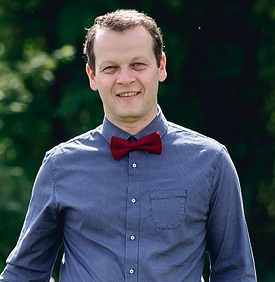Technological competency is one of top skills for the future
Technological advancement, competition, and other factors are altering the demand for specialists and their competencies. Nowadays, not only private businesses but also public institutions are competing for skilled personnel, and professionals educated in Europe must be globally competitive. According to the World Economic Forum’s Future (WEF) Jobs Report, 50 per cent of all employees will need reskilling by 2025. Meanwhile, employers think that the need for critical thinking and problem-solving skills will grow in the next five years.
Below are the 10 job skills for 2025 by WEF explained by ECIU University teamchers in Lithuania.
Technology use, monitoring and control; Technology design and programming

Industry 4.0 challenges are directly related to the use, monitoring and control of modern technologies. With the automation and robotisation of technological processes, the global job market requires more specialists with technological competencies.
According to Dr Virginijus Baranauskas, associate professor at the KTU Faculty of Electrical and Electronics Engineering, the ability to combine different systems into one provides employees with added value. A specialist who is able not only to programme industrial systems but also to use advanced technologies such as image recognition, augmented reality and others is highly valuable.
“The job market needs not only specialists who can maintain technological lines but also technological systems’ designers. Digital twin technologies, that help to create digital layouts of technological lines or an entire factory, are getting more popular; technological lines are fully programmed and tested in operating modes”, he explains.
During ECIU University challenges, students learn about the latest technology and market trends. Both university and business stakeholders consult students.
“There are many students who have basic knowledge of programming and can write algorithms that allow them to monitor and control certain processes, to create special content gadgets. Communication with the business and public institutions’ representatives who present the challenges for solving, stimulates critical thinking, technological creativity and the technical side of innovations, boosts teamwork skills”, says ECIU University teamcher.
Analytical thinking and innovation

According to Dr Meda Andrijauskienė, ECIU teamcher from Kaunas University of Technology (KTU) School of Economics and Business, new technologies are transforming the job market, therefore the attitude towards learning must change. Therefore, a contemporary student must look for the best possible learning strategy, be proactive and involved, to take responsibility for the learning process.
Active learning and learning strategies
Dr Andrijauskienė equates analytical thinking with the ability to find a needle in a haystack. Today’s reality is characterised by large amounts of data, statistics, daily flow of information, so analytical thinking is useful to select and sort essential information needed in the problem-solving process.
“Analytical thinking skills developed in the job market – determining the reason, forming logical conclusions – are necessary for both specialist’s and top manager’s position.
Complex problem-solving
The ECIU University teamcher emphasises the importance of seeing the big picture when solving complex problems. This competence encourages to have patience with the problem, analyse possible causes of the problem and find potential solutions, plan and adapt the action plan.
“These skills are inherent to humans and artificial intelligence will not replace them. On the contrary, by using artificial intelligence, employees will only increase their productivity”, says Dr Andrijauskienė.
It is predicted that specialists possessing complex problem-solving skills will be needed in companies that provide professional consulting services to legal entities and the entire information and communication technology sector.
Critical thinking and analysis
According to ECIU University teamcher Dalia Čalnerytė, critical thinking is inseparable from information analysis, the study of assumptions and arguments, cause-and-effect assessment. While tackling different problems, usually people follow an instinct to eliminate the problem. However, critical thinking helps to identify the cause of the challenge rather than its reason and to find a solution. Critical thinking is also important in assessing the impact of a proposed solution.
Creativity, originality and initiative
Dr Čalnerytė states that in solving real problems it is important not only to apply traditional methods but also to look for new ways and perspectives, create new assumptions, combine different disciplines and methods. Creative problem solving allows to change the usual assumptions and solutions and offer original products using new technologies and processes.
“In today’s environment, technology and societal behaviour are evolving continuously, therefore, solutions that worked well a few years ago may no longer be applicable now. The students approach the ECIU challenge with no preconceived notions; the solution plan and strategy must be devised by them after a thorough analysis of the challenge’s context”, says Dr Čalnerytė.
Because the challenge-solving process is brief, each team member must take the initiative and not only identify but also provide solutions to the difficulties that arise.
Leadership and social influence
Successful teamwork can help to achieve excellent results. Dr Čalnerytė says that informal leadership involves the development of a team’s common goal and the mobilisation of the best different competencies of its members to achieve that goal. As a result, team members need to share information and good practice, resolve conflicts and take responsibility.
“Balanced relationship, when any member can become a team leader at the right time, can be transferred from the job market to the social environment, thus creating a sustainable society. During ECIU challenges, students learn to discuss, listen and present comprehensible arguments. This experience helps to understand different jobs and contributes to sustainable social development. One stage of challenge-based learning is dividing responsibilities, during which students learn when they need to take the lead”, says Dr Čalnerytė.
Resilience, stress tolerance and flexibility

The importance of these competencies is inseparable from global development, which poses different threats to society, the environment or health, such as the challenges posed by the COVID-19 pandemic, which affected many areas of life. According to Inga Stasiulaitienė, associate professor at the KTU Department of Environmental Technology, employers seek people who can swiftly reposition themselves, manage stress, and be flexible in different situations. Personal resilience helps maintain or regain employability despite problems or failures. Meanwhile, flexibility and stress tolerance help maintaining high work efficiency.
Reasoning, problem-solving and ideation
Employers are also seeking employees who can think critically and aren’t scared to decide or come up with new ideas. According to Dr Stasiulaitienė, assessing difficulties, analysing them, and making decisions add value to employees who want to establish themselves in the job market.




